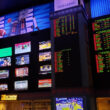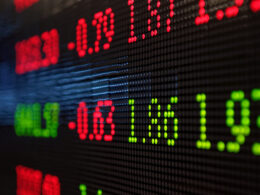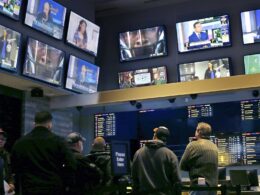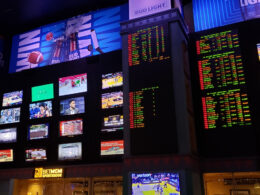By Only Players Staff
Updated 4/17/24 3:55am ET
This term applies to a casino or sportsbook’s profit. Additionally, it also applies to a projected profit.
Photo Courtesy: Google Creative Commons
Sports betting is complicated and it can be intimidating as a new bettor. We’re here to help.
Mariah
Get out your papers and pencils. It’s time for Betology. School is in session. Betting, terminology broken down by Professor Doug here. And our topic for the day is Hold.
Doug
There are really two avenues you hear the word hold in sports betting, or even gambling conversations. One is before the action, and then the other is after.
So let’s start sort before. What is the hold or expected hold percentage? Which means, what’s the advantage to the house? Okay, so on the casino floor, there’s all these games. And each one, because the math is pretty clean on like a deck of cards for blackjack, baccarat, other games. And then there’s the craps table, there’s the roulette wheel, there’s slot machines. They all have an inherent edge to the house and that’s a hold percentage. So blackjack’s in the neighborhood of like 11 or 12% hold, meaning of all the money bet, their expected rate of return or ROI, is this percentage. Now, obviously the cards can come out a certain way, players can double down, play recklessly, but that’s the average hold. And they do these casino numbers, they take inventory, they report it to the state gaming, and the gaming has their monthly reports. Penny slots you would not believe is like such a cash cow for the house because people are probably more reckless with their money and penny slots, things like that. So that’s sort of the coming into things, like that’s the expected profit. They’ll also have sort of results, especially the Super Bowl. What was the hold percentage on the Super Bowl? So of all the money bet, we won this, that means our hold percentage was 6% or 8%.
That’s how the house did on a particular event, particular game. So, you know, with, with sports betting in Nevada, because bettors are further along in terms of more educated than other states, which are newer, you’re looking at about five or 6% between 4 and 6% probably is the safe estimate of what the household’s now they have to pay taxes, they have to pay fees. They have to pay their staff. They have to pay a lot of overhead for all that. Now obviously technology has come a far long ways. The app does a lot of the heavy lifting, but for the most part, they do have odds makers, they do have tellers at the window, but the whole percentage is between four and 6% in Nevada. In other states, because there’s more recreational bettors, that’s a higher percentage. And then obviously certain events will skew the odds. Maybe, I don’t know, the North Carolina Tar Heels go all the way to the final four, and North Carolina is a relatively new state, the legalized betting, and then let’s say everyone in the state was betting on the UNC and they, you know, let’s say the whole percentage ended up being 2% because the house took such a hit on the team. So that’ll move back and forth based on events, some things that are outliers, but that’s basically how it’s computed because what they report in sports, it’s around four to 6%, at least in Nevada and a little higher in other states.
But I think it’s really important to look at the futures market. So what is the futures market? It’s all these sort of indexes, which is just a list of things where only one thing can win. So like you have a list of all 32 NFL teams, only one team can win the Super Bowl. So you got the Chiefs all the way down to the Panthers and all the teams in between and you see some attractive payouts. But remember, let’s say a 12 to 1 hits, 31 other teams are going to lose and they’re going to keep all the money for those teams. So sportsbooks do really well in golf. You know, there’s only one guy who’s going to win the golf tournament or the futures or the MVP or the Home Run champ or the scoring champ. So they have an inherent hold percentage that they’re guaranteeing themselves and it’s around 20%. So they’ll move all the odds. So let’s say they take a big bet at 10 to one on the Astros or whoever, then they’ll move the Astros from 10 to one to eight to one and then adjust other teams a little bit, you know, from another team from seven plus 700 to plus 750, another team from 11 to 11 and a half to one and they’ll skew it so that whole percentage stays. They have all the math and then the computer formula figures it out, no matter which team wins.
Now it’s never perfect, but for the most part, their whole percentage is around 20%. Some books go higher, some books go to like 17%, some fair books, things like that. So that’s why we always say to shop around, because every book’s gonna have a little bit different number based on the bets they’ve taken. So if you like a team that’s 17 to one, you might be able to get 18 to one in another book, because they’re all moving their numbers to maintain their sort of in-house protocol of what they think their futures market, what their whole percentage should be on every single market, whether it’s the MVP, a golf tournament or whatever.
So that’s how it’s all done. And so that’s why we see variance in different numbers depending on the sportsbook. And then each book might mean, look, some of these sports books know that if you’re staying in their hotel and you’re less likely to walk down the strip and go chase a little bit better number or you’re not even going to look, you’re just going to bet what’s there. So sometimes they have a higher hold percentage because they want to make money. They’re all trying to make money as are you when you make your wager. So I understand it for both sides, but that’s the inherent hold percentage. That’s more of like a company policy. Not every book’s the same, but it varies between 17 and 23% or so. And then obviously the casino has their whole percentage and then each game books move the number, but like, they’re never going to have exactly the same amount of money on both sides on any game of the point spread, but ultimately their hole percentage is high, like high single digits, like 9%, 8% in other states. In Nevada, it’s around five or six.
Mariah
It’s interesting how it all ties together like that. They all influence each other.
Doug
It’s all math is what it is. And we’ve talked about it a bunch. The math of a roulette wheel, and we know the math of how many reds, how many blacks, and the two greens, that’s clean. Craps table, very clean math. But blackjack, not as clean. Sports, not as clean, but it kinda is when you get into the futures markets, to your point.
Mariah
Okay, interesting. Well, there you have it on hold. Hopefully that answers all of your questions. Class is officially out of session.







